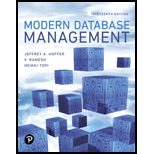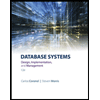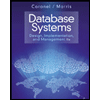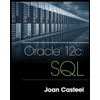
Modern Database Management
13th Edition
ISBN: 9780134773650
Author: Hoffer
Publisher: PEARSON
expand_more
expand_more
format_list_bulleted
Concept explainers
Textbook Question
Chapter 2, Problem 2.27PAE
You may have been assigned a CASE or a drawing tool to develop conceptual data models. using this tool, attempt to redraw all the E-R diagrams in this chapter. What difficulties did you encounter? What E-R notations did not translate well to your tool? How did you incorporate the E-R notation that did not directly translate into the tool's notation?
Expert Solution & Answer
Want to see the full answer?
Check out a sample textbook solution
Students have asked these similar questions
Create a relationship between the common field (Technician Number) of the two tables. Make sure that each client must have 1 and only 1 technician assigned, and each technician can have multiple clients.
2. Create a query to show the Client Number, Client Name, Billed, Paid for clients in Anderson city. Save the query.
3. Create a query to show the Technician Number, Last Name, First Name, YTD Earnings for technicians whose Hourly Rate is greater than or equal to 30. Save the query.
4. Create a query to show Client Number, Client Name, Billed, Paid for clients whose technician number is 22 and whose Billed is over 300. Save the query.
5. Create a query to show the Technician Number, Last Name, First Name, Client Number, Client Name for clients whose technician number 23. Save the query.
6. Create a query to show the Technician Number, Last Name, First Name, Client Number, Client Name for clients whose technician number 23 or 29. Save the query Help please Microsoft office access
Dijkstra's Algorithm (part 1). Consider the network shown below, and Dijkstra’s link-state algorithm. Here, we are interested in computing the least cost path from node E (note: the start node here is E) to all other nodes using Dijkstra's algorithm. Using the algorithm statement used in the textbook and its visual representation, complete the "Step 0" row in the table below showing the link state algorithm’s execution by matching the table entries (i), (ii), (iii), and (iv) with their values. Write down your final [correct] answer, as you‘ll need it for the next question.
4. |z + 5 - 5i| = 7
Chapter 2 Solutions
Modern Database Management
Ch. 2 - Define each of the following terms: entity type...Ch. 2 - Match the following terms and definitions....Ch. 2 - Contrast the following terms: stored attribute;...Ch. 2 - Prob. 2.4RQCh. 2 - Prob. 2.5RQCh. 2 - Prob. 2.6RQCh. 2 - State six general guidelines for naming data...Ch. 2 - Prob. 2.8RQCh. 2 - Prob. 2.9RQCh. 2 - State three conditions that suggest the designer...
Ch. 2 - List the four types of cardinality constraints,...Ch. 2 - Give an example, Other than those described in...Ch. 2 - What is the degree of a relationship? List the...Ch. 2 - Give an example (Other than those described in...Ch. 2 - Give an example of each of the following, other...Ch. 2 - Give an example of the use of effective (or...Ch. 2 - State a rule that says when to extract an...Ch. 2 - Prob. 2.18RQCh. 2 - In addition to explaining what action is being...Ch. 2 - For the Manages relationship in Figure 2-12a,...Ch. 2 - Explain the distinction between entity type and...Ch. 2 - Why is it recommended that every ternary...Ch. 2 - A cellular operator needs a database to keep track...Ch. 2 - Prob. 2.24PAECh. 2 - Answer the following questions concerning Figure...Ch. 2 - Prob. 2.26PAECh. 2 - You may have been assigned a CASE or a drawing...Ch. 2 - Consider the two E-R diagrams in Figure 2-25 Q,...Ch. 2 - Prob. 2.29PAECh. 2 - Are associative entities also weak entities? Why...Ch. 2 - Because Visio does not explicitly show associative...Ch. 2 - Figure 2-26 shows a grade report that is mailed to...Ch. 2 - Prob. 2.33PAECh. 2 - The Is Married To relationship in Figure 2-12a...Ch. 2 - Figure 2-27 represents a situation of students who...Ch. 2 - Figure 2-28 shows two diagrams (A and B), both of...Ch. 2 - Prob. 2.37PAECh. 2 - Review Figure 2-8LQ and Figure 2-22. Identify any...Ch. 2 - Prob. 2.39PAECh. 2 - Prob. 2.40PAECh. 2 - Prob. 2.41PAECh. 2 - Prob. 2.42PAECh. 2 - Prob. 2.43PAECh. 2 - Prob. 2.44PAECh. 2 - Prob. 2.45PAECh. 2 - Prob. 2.46PAECh. 2 - Prob. 2.47PAECh. 2 - Prob. 2.48PAECh. 2 - Draw an ERD for the following situation. (State...Ch. 2 - Prob. 2.50PAECh. 2 - Prob. 2.51PAECh. 2 - Review your answer to Problem and Exercise 2-49 if...
Knowledge Booster
Learn more about
Need a deep-dive on the concept behind this application? Look no further. Learn more about this topic, computer-science and related others by exploring similar questions and additional content below.Similar questions
arrow_back_ios
SEE MORE QUESTIONS
arrow_forward_ios
Recommended textbooks for you
 Database Systems: Design, Implementation, & Manag...Computer ScienceISBN:9781305627482Author:Carlos Coronel, Steven MorrisPublisher:Cengage Learning
Database Systems: Design, Implementation, & Manag...Computer ScienceISBN:9781305627482Author:Carlos Coronel, Steven MorrisPublisher:Cengage Learning Database Systems: Design, Implementation, & Manag...Computer ScienceISBN:9781285196145Author:Steven, Steven Morris, Carlos Coronel, Carlos, Coronel, Carlos; Morris, Carlos Coronel and Steven Morris, Carlos Coronel; Steven Morris, Steven Morris; Carlos CoronelPublisher:Cengage Learning
Database Systems: Design, Implementation, & Manag...Computer ScienceISBN:9781285196145Author:Steven, Steven Morris, Carlos Coronel, Carlos, Coronel, Carlos; Morris, Carlos Coronel and Steven Morris, Carlos Coronel; Steven Morris, Steven Morris; Carlos CoronelPublisher:Cengage Learning Principles of Information Systems (MindTap Course...Computer ScienceISBN:9781285867168Author:Ralph Stair, George ReynoldsPublisher:Cengage Learning
Principles of Information Systems (MindTap Course...Computer ScienceISBN:9781285867168Author:Ralph Stair, George ReynoldsPublisher:Cengage Learning Fundamentals of Information SystemsComputer ScienceISBN:9781305082168Author:Ralph Stair, George ReynoldsPublisher:Cengage LearningNp Ms Office 365/Excel 2016 I NtermedComputer ScienceISBN:9781337508841Author:CareyPublisher:Cengage
Fundamentals of Information SystemsComputer ScienceISBN:9781305082168Author:Ralph Stair, George ReynoldsPublisher:Cengage LearningNp Ms Office 365/Excel 2016 I NtermedComputer ScienceISBN:9781337508841Author:CareyPublisher:Cengage

Database Systems: Design, Implementation, & Manag...
Computer Science
ISBN:9781305627482
Author:Carlos Coronel, Steven Morris
Publisher:Cengage Learning

Database Systems: Design, Implementation, & Manag...
Computer Science
ISBN:9781285196145
Author:Steven, Steven Morris, Carlos Coronel, Carlos, Coronel, Carlos; Morris, Carlos Coronel and Steven Morris, Carlos Coronel; Steven Morris, Steven Morris; Carlos Coronel
Publisher:Cengage Learning

Principles of Information Systems (MindTap Course...
Computer Science
ISBN:9781285867168
Author:Ralph Stair, George Reynolds
Publisher:Cengage Learning

Fundamentals of Information Systems
Computer Science
ISBN:9781305082168
Author:Ralph Stair, George Reynolds
Publisher:Cengage Learning

Np Ms Office 365/Excel 2016 I Ntermed
Computer Science
ISBN:9781337508841
Author:Carey
Publisher:Cengage

Enhanced Entity Relationship Model; Author: Data Science Center;https://www.youtube.com/watch?v=ocQUtXPumdQ;License: Standard YouTube License, CC-BY